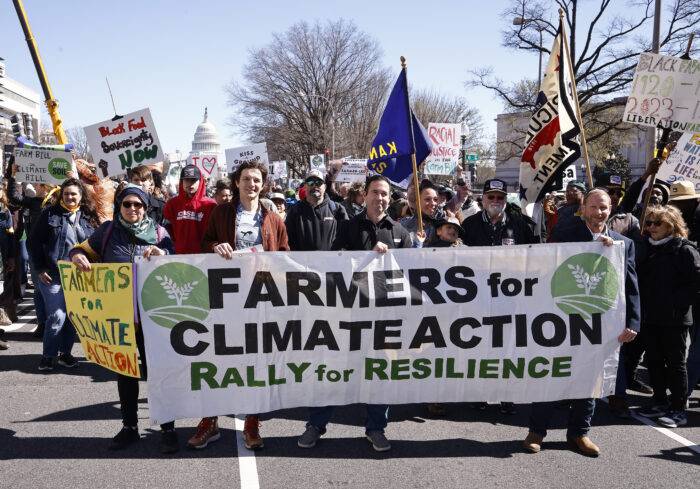

A Whirlwind Year
It has been a long, unusual year for federal policy, and the implications for sustainable agriculture and food systems policy have been unmistakable.
2023 was supposed to be the year the farm bill was reauthorized. But, as our readers know, the 2018 Farm Bill expired on September 30. More than a month later, Congress extended the 2018 Farm Bill’s authority through September 30, 2024, extending the window of opportunity to reauthorize the five-year bill during this Congressional cycle. This significant delay in reauthorization is not unprecedented and highlights the complex circumstances looming over the 118th Congress heading into 2024.
Before the current session of Congress ever began, the 117th Congress passed the Inflation Reduction Act (IRA) in August 2022. Combined with the fall 2022 midterm elections, the drafting and passage of the IRA left relatively little opportunity to lay the groundwork needed for the upcoming farm bill reauthorization. The midterm elections also brought many new lawmakers to Capitol Hill in January 2023, giving Congress a slower start and requiring robust lawmaker education efforts. As the current session of Congress began in earnest, the consequences of the GOP’s slim majority in the House of Representatives became more apparent by the day – from a protracted process to elect a Speaker of the House, disagreements over the debt limit, and two stop-gap continuing resolutions, one of which extended the 2018 Farm Bill, and one of which cost Rep. Kevin McCarthy the House Speakership. As of late December 2023, the threat of a government shutdown in January and February 2024 still looms as appropriators have to this point failed to reach an agreement on FY2024 spending.
Throughout all of this, our coalition has remained steadfast, laying the groundwork for a strong 2023 and now 2024 Farm Bill, working with our partners at the USDA to make administrative improvements to food and agriculture programs, and facing these challenges head-on together through grassroots power building, strengthening relationships, and elevating the stories of the dedicated farmers on the ground. Despite so much being out of our control, here are some of the many things we accomplished this year.
Looking Back
Groundwork for a Better Farm Bill: NSAC’s 2023 Farm Bill Platform put forward a comprehensive vision to build a more resilient and equitable food and farm system in the next farm bill. Our work, structured around the four pillars of our platform, sought to invest in healthy urban and rural communities, level the playing field for small and mid-sized farmers, advance racial equity across the food system, and build a climate-resilient future.
We scoped, drafted, and introduced so many ‘marker bills’ this year grounded in the needs and solutions of farmers in the field, including:
- The Farmers Market and Food Bank Local Revitalization Act of 2023,
- The Strengthening Local Processing Act,
- A revised and expanded Agriculture Resilience Act of 2023,
- The Local Farms and Food Act,
- The Seeds and Breeds for the Future Act,
- The Converting Our Waste Sustainably Act (COWS Act),
- The Organic Science and Research Investment Act,
- The Strengthening Organic Agriculture Research (SOAR),
- The Supporting Urban and Innovative Farming Act, and
- The Whole Farm Revenue Protection Improvement Act,
At NSAC we never work alone: we developed all of these bills in close partnership with members and allies! Our work in 2024 will be to ensure these important policy asks and investments are included in the final farm bill.We also leveraged our coalition’s collective voice in allyship to endorse and build support for important bills led by partners and coalition members, including: the Justice for Black Farmers Act, Farmland for Farmers Act, Fair Credit for Farmers Act, Protecting America’s Meatpacking Workers Act, Supporting Our Farm and Food System Workforce Act, Voice for Farm Workers Act, Agricultural Worker Justice Act, Fresh Produce Procurement Reform Act, Farm Program Integrity Act, Small Farms Conservation Act, and the Increasing Land Access, Security, and Opportunities Act, both of which were led by the National Young Farmers Coalition, an NSAC member.
Appropriations to Defend Funding for Farmers and Communities: Although Congress has not yet approved FY2024 appropriations bills, significant action has been happening on the appropriations front, and NSAC has advocated at each step for investments to support farmers and communities. The House FY24 bill, which passed out of the agriculture appropriations subcommittee but failed a floor vote, included severe cuts to a range of programs – well below the cuts agreed upon in the debt-limit deal – and would rescind portions of USDA’s climate-focused COVID era funding. The Senate, on the other hand, approved its FY2024 “minibus” which included the agriculture spending bill and provided the Senate with some leverage over the House in negotiations for any final FY2024 appropriations.
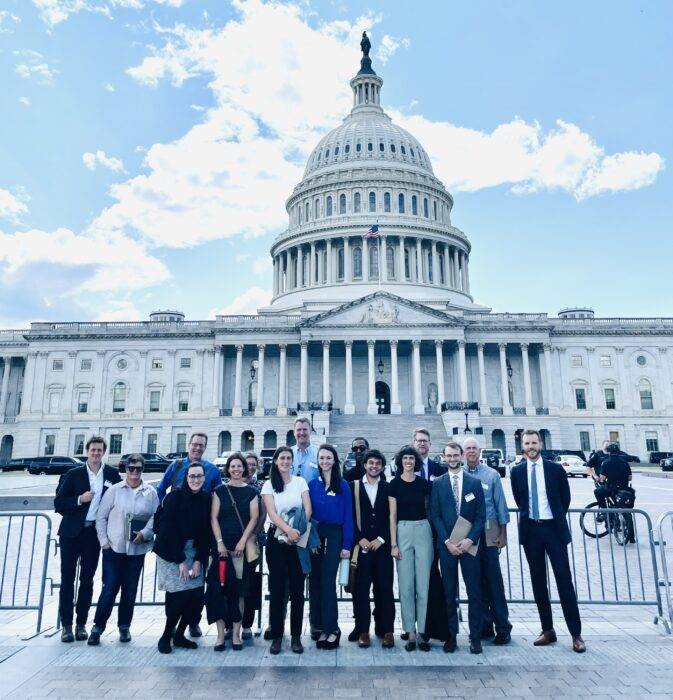
In an incredibly challenging fiscal year – with strict limits on spending – NSAC succeeded in defending our priorities in the Senate minibus, and we’ll carry this fight forward into ongoing spending debates in 2024. Funding levels for several NSAC priority programs are as follows:
- Sustainable Agriculture Research and Education Program, $ 50 million
- Organic Transition Research Program, $ 7.5 million
- WIC Farmers Market Nutrition Program, $ 20 million
- Conservation Technical Assistance, $ 800 million
- Grazing Lands Conservation Initiative, $ 10 million
- Office of Urban Agriculture & Innovative Production, $ 8.5 million
We also mounted defense against surprise spending cuts: the future of the Office of Urban Agriculture and Innovative Production (OUAIP) was threatened by being left out of both Senate and House Agriculture Appropriations bills in 2023. NSAC rallied a call with 140 organizations and farms to Congress to save the program and its funding. We are pleased to report that the recently advanced Senate agriculture appropriations bill included an amendment to restore funding for the Office of Urban Agriculture and Innovative Production.
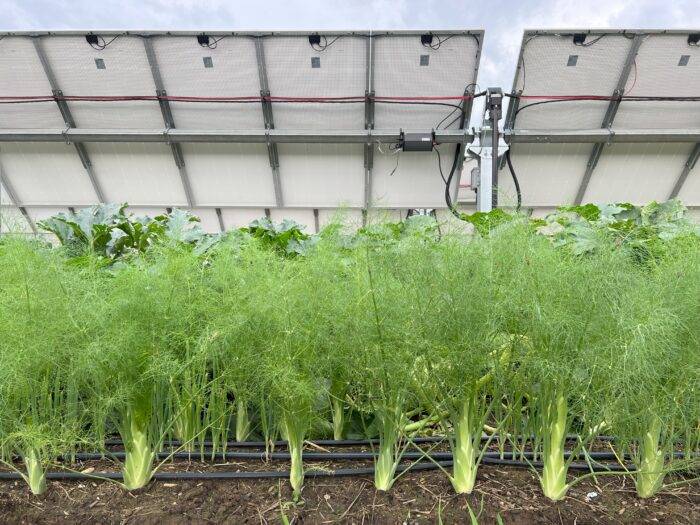
Throughout the year, our coalition worked diligently to defend the funding commitments made through the Inflation Reduction of 2022. Since the signing of the Inflation Reduction Act in 2022, defending this historic climate funding for agriculture has been a top coalition priority. Highlights from our actions to protect this funding include:
- 644 organizations and farms signed an NSAC-led letter to Congress calling for the defense of this funding.
- We hosted a Congressional briefing on IRA defense for House Democratic staffers.
- We actively supported several coalitions of advocacy partners conducting hundreds of meetings with Hill staff calling for the protection of IRA funding in the 2023 Farm Bill.
- We highlighted critical analysis that illustrates the impact of IRA funding and the need for sustained support for investments in climate-friendly agriculture.
We’re heartened to see that this advocacy has paid off so far in strong commitments from lawmakers like Senator Debbie Stabenow to protect this critical funding. Our collective work in 2024 will be to ensure that the next farm bill can establish a dedicated, permanent source of funds for farmers addressing climate change and significantly improve producers’ ability to get support for high-impact conservation practices that protect our shared soil, air, water, and wildlife.
USDA Implementation: We conducted extensive behind-the-scenes dialogue with USDA officials to share feedback from the field and press for effective program implementation that works for growers and communities. Here are some highlights from this work this year.
Protecting Climate Funding
NSAC and its members helped fight for the IRA in Congress, and we have stayed engaged since its passage to help ensure farmers across the country access these resources and enroll in programs like CSP and EQIP. Staff and coalition members worked diligently to promote IRA funded programs to farmers and communicate needs from the field directly with NRCS state and national staff. Even with increased funding, NRCS reported receiving far more applications than funding available: showing that increased investment in these programs remains critical. NRCS has also reported state level data showing over 99% of all IRA dollars made available this year were obligated by October 2023.This is a massive victory made possible by our collective commitment to support farmers accessing conservation programs and the drive of thousands farmers themselves to improve their operations through high levels of conservation stewardship.
We also are working directly with key agency staff to shape how programs are rolled out: for example, by offering input grounded in climate impacts on NRCS’s list of “climate-smart ag and forestry practices” (CSAF) – this practice list outlines which practices under conservation programs like Environmental Quality Incentives Program (EQIP) and Conservation Stewardship Program (CSP) are eligible for priority climate-focused funding from the Inflation Reduction Act boost to conservation programs. For more detailed analysis, see our blog post: Correcting the Record: The IRA Made More Money Available for All Conservation Work.
Expanding Small-farm Access to CSP
After years of advocacy from NSAC, both at USDA and in Congress, in 2023 NRCS opted to increase the minimum contract amount in CSP from $ 1,500 to $ 4,000. This increase will apply to contracts signed this year and all years going forward, barring any additional changes to CSP in the farm bill. This is a victory for small and diversified producers across the country, as it ensures that regardless of your farm size, farmers will receive worthwhile support for pursuing high levels of stewardship through CSP. For a closer look at why CSP is perhaps the single most ready-made tool for farmers to voluntarily tackle climate change, see our recent blog post: Building Resilience Through the Conservation Stewardship Program.
Aligning Good Farming Practice Standards
In another major win in 2023, after years of advocacy efforts, USDA’s Risk Management Agency (RMA) recently made significant updates to the definition of Good Farming Practices (GFPs). The changes remove a longstanding obstacle to the adoption of Natural Resources Conservation Service (NRCS)-approved conservation practices and enhancements for insured producers. The previous condition that NRCS conservation practices should not negatively impact crop progress or yields has been eliminated, allowing for the appropriate use of USDA-approved conservation practices as Good Farming Practices for crop insurance. This is a crucial step in encouraging the voluntary adoption of good soil health practices among farmers enrolled in the crop insurance program. While acknowledging the progress, we look forward to continuing to partner with the agency to see continued improvements to their programming and guidance.
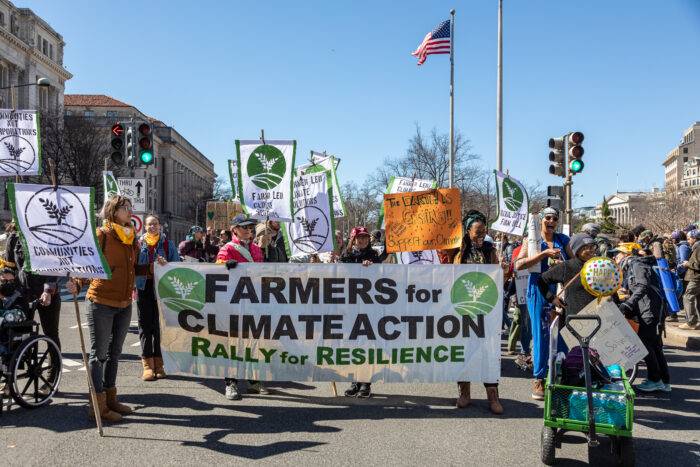
Grassroots Power Building: This year we convened farmers and food systems professionals from across the country to discuss important policy and program improvements for a more sustainable and resilient farm system. NSAC co-led the Farmers for Climate Action: Rally for Resilience, which brought together over 500 farmers from over 40 states and 2 territories. Farmers and farm organizations from all over the country shared a united request for their members of Congress–to make climate change policy a priority and include critical support for Black, Indigenous, and people of color (BIPOC) producers in the upcoming 2023 Farm Bill. The three-day event had three themes – farmer-led climate solutions, racial justice, and communities, not corporations.
We hosted and participated in three different lobby days in Washington, DC this year, helping farmers, ranchers, and community advocates tell their stories and elevate critical needs from their states directly to lawmakers.
- In February, we hosted a lobby day where NSAC coalition members held nearly 100 meetings with Congressional leaders and senior USDA officials to encourage them to prioritize sustainable food and farm needs and farmer-led solutions in the upcoming farm bill reauthorization.
- On the heels of the Rally for Resilience in March, advocates marched from the streets to the Capitol and held more than 100 meetings with Congressional staffers and members of Congress.
- For our June “fly-in”, farmers, ranchers, and community advocates joined us for over 20 meetings with USDA and Congress, including key committee staff for the “four corners”: the chairs and ranking members of the Senate and House Agriculture Committees. Farmers shared their stories and called for stronger, better-funded sustainable agriculture programs in the next farm bill.
Building on the momentum from the rally, this fall we held a Farmer Climate Week of Action, which coincided with Climate Week in late September. The week of action culminated at the annual Farm Aid 2023 concert held in Noblesville, Indiana on September 23. NSAC staff hosted the Farm Aid Action Center and engaged with festivalgoers, encouraging them to take action on climate. NSAC also delivered policy priorities for the 2023 Farm Bill under the “climate action” plank at a People’s Hearing with senior USDA officials the day before the festival.
Stories matter so much in helping make the case for why policy change is needed: this year we used our blog to lift up stories of farmers – like here, featuring farmers who have used conservation programs to support climate-friendly farming.
Member Meetings: NSAC members invest so much time and effort all year round collaborating with NSAC staff through our issue committees and councils on policy development, advocacy, and grassroots outreach. We were thrilled to spend quality time in-person with our inspiring membership this year at our two member meetings.
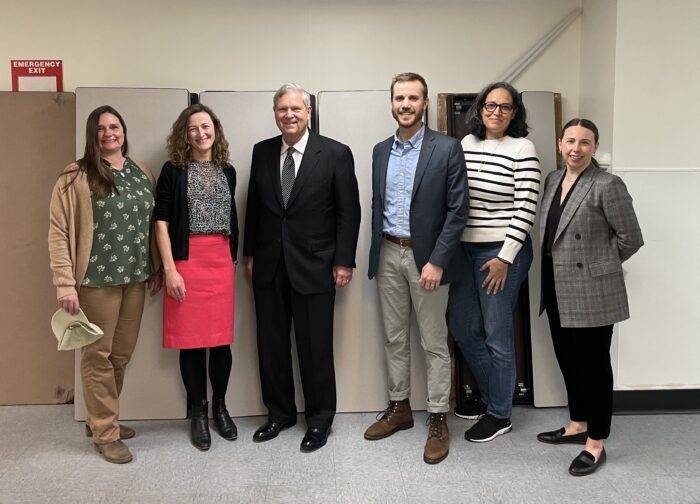
In late January, 100 attendees from 61 member organizations came together for our annual winter meeting in Washington, DC to strategically coordinate campaign tactics, meet with Congressional leaders and senior USDA officials, and connect through a shared vision of a just food and farm system for all. US Secretary of Agriculture Thomas J. Vilsack joined to share an update on USDA’s work under the Biden-Harris Administration to strengthen local food systems, diversify supply chains, and build economic opportunities for rural communities and fielded questions from our members on how to continue advancing needed agency administrative reforms.
In August, more than 100 members and NSAC staff from across the country gathered at the foothills of the Rocky Mountains to re-energize and strategize around our continued farm bill work. The meeting was an excellent chance to forge relationships with key partners and allies in the sustainable agriculture and food movement, to further inform our work and strategy.
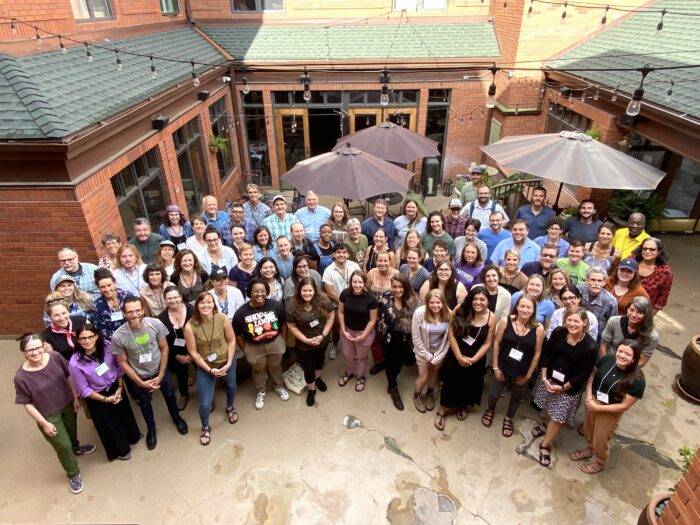
On Tap for 2024
While the 2018 Farm Bill extension through September 2024 offers a degree of stability and a little breathing room, we are now more than five years removed from the passage of the 2018 Farm Bill. The years since then have been tumultuous – as an increasingly disruptive and changing climate, the COVID-19 pandemic and societal impacts, and a long-overdue racial justice reckoning revealed the fragility of our current food system. Farmers, ranchers, and food system stakeholders deserve updated, comprehensive federal food and farm policy that levels the playing field, invests in a climate resilient future, and advances racial equity. We will continue to campaign around our priorities of addressing climate change, bolstering resilient local and regional food systems, and promoting farm safety net reforms in the new year and urge Congress to pass a strong, bipartisan farm bill in early 2024.
To share a bit of what is in store in the coming months, NSAC is:
- Expanding! We are adding two new roles to grow our team – one focused on cross-portfolio research and analysis and one on cross-organization administrative support;
- Planning for a climate-focused farmer briefing on the Hill in early January;
- Releasing a detailed report that examines the current farm safety net, discusses persistent barriers underserved producers experience when attempting to access programs like the federal crop insurance program, and makes policy recommendations;
- Excited to see our members again at our upcoming Winter Meeting; and much more!
The end of a year signifies a time to reflect on all of the most important accomplishments and challenges of the past year. We celebrate all we have achieved and recognize how our accomplishments this year set us up for the busy months ahead as Congress moves the farm bill reauthorization process forward.

A Final Note of Gratitude
As we pause at the close of 2023 to reflect and rest before 2024, NSAC would like to recognize the monumental strides our coalition has made. To our invaluable members, allies, champions, partners, and donors – your unwavering support has been the driving force behind our impactful year. Here’s to you, to us, and to the hope of more sustainable, equitable transformations in the food and farming system. Thank you for being a vital part of our journey and for not standing down even in the face of challenges beyond our control. We look forward to partnering with you to continue to shape positive change together.
The post Sowing Seeds of Impact: NSAC’s Year in Review and Vision for 2024 appeared first on National Sustainable Agriculture Coalition.